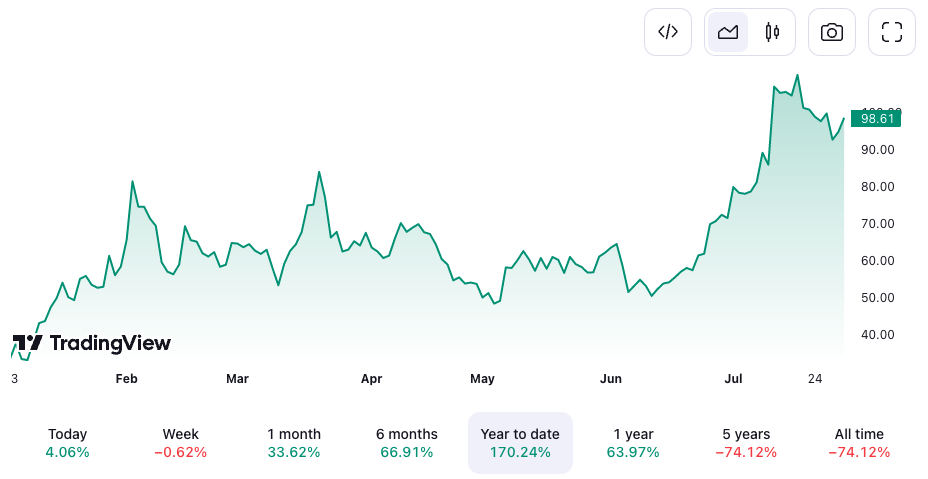Circle’s USD Coin (USDC) and other stablecoins could potentially face a compliance nightmare if a new national defense bill that passed in the United States Senate makes it all the way.
In a July 31 investment note seen by Cointelegraph, Berenberg analyst Mark Palmer explained that a recent amendment to the 2024 National Defense Authorization Act (NDAA), could potentially introduce new KYC and anti-money laundering measures that stablecoin issuers will be unable to comply with.
“The amendment would require the U.S. Treasury Secretary to ‘establish examination standards for crypto assets’ that would help regulators to ensure compliance with money laundering and sanctions laws,” wrote Palmer, adding:
“We believe this amendment, if it remains in the final version of the NDAA, could be problematic."
Palmer explained that the identities of stablecoin holders can only be determined when the asset is issued and redeemed. “Such an outcome would likely cause further deterioration in USDC’s market cap,” he warned.
In recent months, USDC’s market cap has been on the decline, falling $17.5 billion — roughly 39% — since March 5.
Knock on effects for Coinbase
While this could be a significant setback for Circle, it could also prove problematic for Coinbase, said Palmer, noting the exchange “derived 27% of its net revenue from interest income on USDC” in the first quarter of this year.
Since the beginning of the year, Coinbase shares have drastically outperformed the traditional equities market, surging 170% from a price of $33 on Jan.1 to $98.61 at the time of publication.
 Coinbase stock year-to-date price chart. Source: TradingView
Coinbase stock year-to-date price chart. Source: TradingView According to Berenberg, there were two main reasons for this outperformance. The first was the favorable ruling handed down to Ripple Labs and the second was the flurry of filings for spot Bitcoin ETFs from major institutions such as BlackRock and Fidelity.
Related: Coinbase denies SEC told it to delist everything but Bitcoin
The analysts noted that these two drivers of bullish activity for Coinbase stand on shaky ground, as recent comments from SEC Chair Gary Gensler have “poured cold water on the primary sources of the rally.”
In a July 28 interview with Bloomberg, Gensler said crypto investors shouldn’t assume that cryptocurrencies do not fall under the purview of the SEC. Additionally the analysts believe that Gensler's tepid response to a question concerning Bitcoin ETF applications implied that he may oppose their approvals.
Overall, Berenberg maintained its “hold” rating for Coinbase stock, noting that while there is still “significant uncertainty” for Coinbase in the future, its large balance of cash and equivalents provides “cushion and flexibility” in ensuring the financial longevity of the company.
Source: cointelegraph Visit leading cryptocurrency exchanges:
#1
OKX - 24h Volume: $ 1 097 255 972.
OKX is an Hong Kong-based company founded in 2017 by Star Xu. Not available to users in the United States.
#2
ByBit - 24h Volume: $953 436 658.
It is headquartered in Singapore and has offices in Hong Kong and Taiwan. Bybit works in over 200 countries across the globe with the exception of the US.
#3
Gate.io - 24h Volume: $ 643 886 488.
The company was founded in 2013. Headquartered in South Korea. Gate.io is not available in the United States.
#4
MEXC - 24h Volume: $ 543 633 048.
MEXC was founded in 2018 and gained popularity in its hometown of Singapore. US residents have access to the MEXC exchange.
#5
KuCoin - 24h Volume: $ 513 654 331.
KuCoin operated by the Hong Kong company. Kucoin is not licensed to operate in the US.
#6
Huobi - 24h Volume: $ 358 727 945.
Huobi Global was founded in 2013 in Beijing. Headquartered in Singapore. Citizens cannot use Huobi in the US.
#7
Bitfinix - 24h Volume: $ 77 428 432.
Bitfinex is located in Taipei, T'ai-pei, Taiwan. Bitfinex is not currently available to U.S. citizens or residents.
My bitcoin-blog:
https://sites.google.com/view/my-crypto-jam/ =)